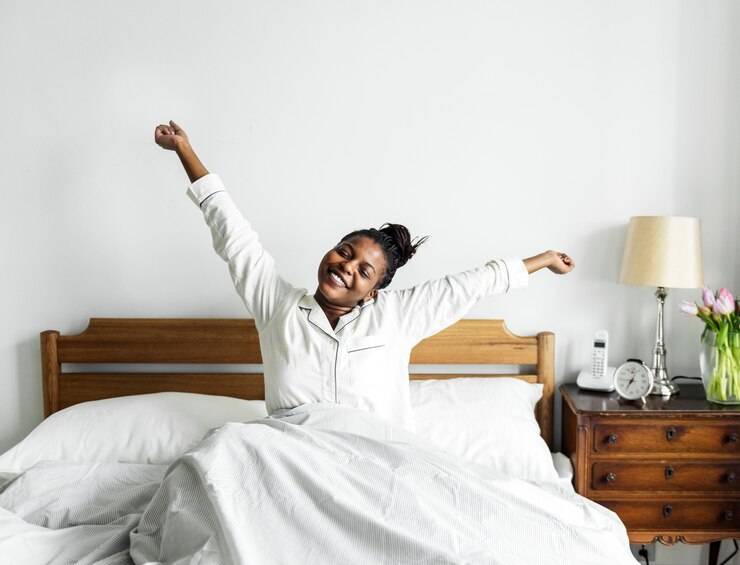9 Ways to Get Better Sleep and Prevent Exhaustion
In today’s fast-paced world, sleep often takes a backseat as we juggle work, family, social obligations, and endless to-do lists. Unfortunately, this lack of quality sleep can quickly lead to exhaustion, making it harder to stay productive, focus, and enjoy life. When you’re constantly running on empty, it can feel like an uphill battle to function effectively, and this ongoing sleep deprivation can impact both your mental and physical well-being.
However, the good news is that there are simple yet powerful strategies you can implement to improve your sleep quality and prevent the cycle of exhaustion. By making a few changes to your habits, environment, and mindset, you can enjoy better sleep, feel more energized during the day, and lead a more balanced, healthy life.
Here are 9 ways to get better sleep and prevent exhaustion, so you can wake up feeling refreshed, rejuvenated, and ready to take on the day.
1. Establish a Consistent Sleep Schedule
One of the most effective ways to improve your sleep quality is by sticking to a consistent sleep schedule. Going to bed and waking up at the same time every day, even on weekends, helps regulate your body’s internal clock, known as the circadian rhythm. This rhythm plays a crucial role in determining when you feel alert or sleepy, and keeping it consistent helps your body understand when it’s time to sleep and when it’s time to wake up.
How to establish a sleep schedule:
- Set a bedtime routine: Create a routine that signals your body that it’s time to wind down. This might include activities like reading, taking a warm bath, or practicing light stretching.
- Avoid long naps: While napping can be refreshing, long or late-afternoon naps can interfere with your ability to fall asleep at night. If you need to nap, aim for 20-30 minutes earlier in the day.
- Be consistent: Try to stick to the same bedtime and wake-up time every day, even on weekends. This helps train your body to follow a natural rhythm.
Consistency is key in helping you regulate your sleep cycle, ensuring you get the restful sleep you need to avoid exhaustion.
2. Create a Relaxing Sleep Environment
Your sleep environment plays a significant role in how well you sleep. If your bedroom is cluttered, noisy, or uncomfortable, it can prevent you from falling asleep quickly and staying asleep throughout the night. A calm, serene space promotes relaxation and helps your body and mind unwind.
Tips for a better sleep environment:
- Optimize your bedroom for sleep: Keep your room clean and organized. Use calming colors like soft blues or greens and avoid bright, stimulating colors.
- Control the lighting: Make your bedroom as dark as possible to signal to your body that it’s time to sleep. Consider using blackout curtains or an eye mask if necessary.
- Reduce noise: Use earplugs or a white noise machine to block out disturbing sounds that might keep you awake.
- Make your bed comfortable: Invest in a supportive mattress, soft sheets, and cozy blankets to ensure that your bed is inviting and comfortable for sleep.
The more peaceful and comfortable your sleep environment, the easier it will be to relax and enjoy a full night of deep, restorative sleep.
3. Limit Screen Time Before Bed
One of the biggest culprits of poor sleep is the blue light emitted by screens—whether from your phone, tablet, computer, or television. Blue light interferes with the production of melatonin, the hormone responsible for helping you fall asleep. Exposure to screens late at night can make it difficult for your brain to signal that it’s time to sleep.
How to limit screen time before bed:
- Turn off screens at least 30 minutes before bed: Aim to avoid looking at screens for at least 30 minutes to an hour before you plan to go to sleep. Use this time to unwind with a book, meditate, or practice deep breathing.
- Use blue light filters: If you must use your devices, enable blue light filters or “night mode†on your phone and computer, which reduces the amount of blue light emitted by the screen.
- Avoid TV or social media: Watching stimulating TV shows or scrolling through social media right before bed can keep your brain active and make it harder to unwind.
By cutting back on screen time before bed, you allow your body to naturally prepare for sleep, making it easier to fall asleep faster and get quality rest.
4. Watch Your Diet and Caffeine Intake
What you consume during the day, especially in the hours leading up to bedtime, can have a direct impact on your sleep quality. Certain foods and beverages—especially those containing caffeine or heavy meals—can interfere with your ability to fall asleep and stay asleep.
Tips for a sleep-friendly diet:
- Limit caffeine: Caffeine is a stimulant that can stay in your system for hours after consumption. Avoid drinking coffee, tea, soda, or energy drinks in the afternoon or evening to prevent it from disrupting your sleep.
- Eat a light dinner: Heavy, rich, or spicy meals can cause discomfort and indigestion, making it harder to fall asleep. Try to eat your dinner at least two to three hours before bed and opt for lighter, easier-to-digest foods.
- Avoid alcohol before bed: While alcohol can make you feel sleepy initially, it can disrupt your sleep cycle, causing you to wake up in the middle of the night.
Choosing the right foods and beverages throughout the day can help you sleep more soundly and avoid the restless nights caused by poor dietary choices.
5. Practice Relaxation Techniques
If your mind is racing with thoughts or worries, it can be difficult to unwind and fall asleep. Incorporating relaxation techniques into your bedtime routine can help calm your mind and prepare your body for rest.
Relaxation techniques to try:
- Deep breathing exercises: Focus on slow, deep breaths to activate your parasympathetic nervous system and signal your body to relax. Try the 4-7-8 technique: inhale for 4 counts, hold for 7 counts, and exhale for 8 counts.
- Progressive muscle relaxation: Tense and then release each muscle group in your body, starting from your toes and working up to your head. This practice helps release physical tension and promotes a sense of calm.
- Guided meditation: Use meditation apps or YouTube videos with guided relaxation or sleep meditations to help you wind down and quiet your mind before sleep.
By incorporating relaxation techniques into your routine, you can ease stress and anxiety, allowing your body to enter a restful state and prepare for a peaceful night of sleep.
6. Exercise Regularly (But Not Too Close to Bedtime)
Exercise is one of the most effective ways to promote better sleep, as physical activity helps regulate your body’s natural sleep-wake cycle. Regular exercise also reduces stress, anxiety, and the physical tension that can keep you awake at night. However, exercising too close to bedtime can have the opposite effect and make it harder to fall asleep.
Exercise tips for better sleep:
- Aim for at least 30 minutes of exercise each day: This could include walking, yoga, running, or weightlifting—anything that gets your body moving and your heart rate up.
- Avoid intense exercise late at night: High-intensity exercise or vigorous workouts should be completed at least three hours before bedtime. While moderate exercise earlier in the day can help with sleep, vigorous exercise can increase adrenaline and make it harder to fall asleep.
Regular physical activity during the day can help you feel more tired and ready for sleep at night, as long as you avoid working out too close to bedtime.
7. Limit Liquids Before Bed
Drinking too many liquids in the evening can lead to frequent trips to the bathroom during the night, disrupting your sleep. While staying hydrated is important, it’s best to limit your liquid intake in the hours leading up to bedtime to avoid waking up in the middle of the night.
How to manage your liquid intake:
- Drink enough water during the day: Ensure you’re staying hydrated throughout the day, but try to reduce the amount of liquid you drink in the hour or two before bed.
- Avoid caffeine or alcohol close to bedtime: Both caffeine and alcohol can disrupt your sleep, so try to limit your intake in the evening hours.
By managing your liquid intake before bed, you can minimize nighttime awakenings and sleep more soundly through the night.
8. Get Exposure to Natural Light During the Day
Exposure to natural sunlight during the day helps regulate your circadian rhythm, making it easier for you to fall asleep at night. If you spend most of your day indoors or under artificial light, it can be harder for your body to distinguish between day and night, leading to disrupted sleep patterns.
How to get more natural light exposure:
- Spend time outdoors: Try to get outside for at least 15-30 minutes each day, especially in the morning. Sunlight exposure helps signal to your brain that it’s time to be awake and alert.
- Open curtains and blinds: Let natural light into your home to help regulate your circadian rhythm.
Getting natural light during the day can help reset your internal clock, making it easier to fall asleep at night and wake up refreshed in the morning.
9. Manage Stress and Mental Health
Chronic stress, anxiety, and depression can all contribute to sleep disturbances. When your mind is preoccupied with worry, it can be difficult to relax and let go of the day. Managing stress and focusing on mental health can significantly improve your sleep quality.
Stress management tips:
- Practice mindfulness: Use techniques like meditation, yoga, or mindfulness to reduce stress and promote relaxation.
- Talk to someone: If you’re dealing with ongoing stress, anxiety, or depression, consider talking to a therapist or counselor. Mental health support can help you manage your emotions and improve your overall well-being, including your sleep.
By addressing the underlying causes of stress and prioritizing your mental health, you can improve your sleep quality and prevent the exhaustion that comes from chronic worry and anxiety.
Conclusion
Getting better sleep and preventing exhaustion doesn’t require drastic changes—it’s all about making small, consistent adjustments to your habits, environment, and mindset. By establishing a consistent sleep schedule, optimizing your sleep environment, limiting screen time, managing stress, and prioritizing relaxation, you can significantly improve your sleep quality and wake up feeling refreshed and energized.
The key to better sleep is a holistic approach that nurtures both your body and mind. Incorporate these strategies into your routine, and you’ll soon find yourself enjoying more restful, rejuvenating sleep—helping you tackle each day with greater energy, focus, and vitality.




No comments yet
Be the first to share your thoughts!